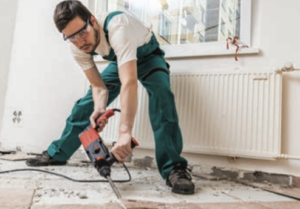By Ken Ryan The never-ending task of recruiting and training installers has been a flooring industry bugaboo for decades. It’s a problem that worsened during COVID-19 when installation work temporarily dried up, sending some installers to the unemployment line while others entered different fields.
Today, any installer worth his/her weight has more work than they know what to do with. As such, they can turn down work, not show up for one day or leave for the rival down the block and now regret it. That said, it is crucial for flooring retailers to keep the good ones.
Following are five approaches retailers have taken during the pandemic to contend with the installation shortage.
1. Cash is king
 Sure, a pat on the back is nice, but it doesn’t pay the bills the way cold, hard cash does. At Allen Carpet One, Annville, Pa., project manager/president, Matt Andrews, said his biggest priority when the shutdown occurred in 2020 was making sure everyone know they had a job when business returned. “We were as transparent with everyone as possible,” he said. “As a company, we decided to pay for the first week we were shut down and then pay an additional week when we started back up.”
Sure, a pat on the back is nice, but it doesn’t pay the bills the way cold, hard cash does. At Allen Carpet One, Annville, Pa., project manager/president, Matt Andrews, said his biggest priority when the shutdown occurred in 2020 was making sure everyone know they had a job when business returned. “We were as transparent with everyone as possible,” he said. “As a company, we decided to pay for the first week we were shut down and then pay an additional week when we started back up.”
Even when business was down about 40% in April and May (2020), Brian’s Flooring & Design in Birmingham, Ala., was thinking about compensating installers. “After those two months, we were ahead of sales from 2019, so it was business as usual,” said Brian McCarver, owner. “I think we were able to retain guys because our workload wasn’t too bad.”
2. Investing in the right tools/equipment
 Not every subcontractor can afford to buy the latest equipment to do the job efficiently. Knowing this, retailers have invested in the equipment themselves to assist their installation teams.
Not every subcontractor can afford to buy the latest equipment to do the job efficiently. Knowing this, retailers have invested in the equipment themselves to assist their installation teams.
Carlton Billingsley, co-owner of Floors & More in Benton, Ark., recently purchased tools for his mechanics so they won’t have to work as strenuously and can make more money.
3. Never stop looking
 With between 20 and 2 installation crews at its disposal, Lancaster, Pa.-based Indoor City would seem to have an abundance of riches. So, why does owner Ryan Commerce keep looking for installers? Because installers are a lot like starting pitchers in baseball—you can never have enough. “As we continue to maintain and grow the business, finding qualified installers is something we’ve got to keep doing,” he said. The second part of this equation is retention. “Simply put, we treat them the way you yourself would want to be treated.”
With between 20 and 2 installation crews at its disposal, Lancaster, Pa.-based Indoor City would seem to have an abundance of riches. So, why does owner Ryan Commerce keep looking for installers? Because installers are a lot like starting pitchers in baseball—you can never have enough. “As we continue to maintain and grow the business, finding qualified installers is something we’ve got to keep doing,” he said. The second part of this equation is retention. “Simply put, we treat them the way you yourself would want to be treated.”
Many flooring retailers rely on their existing installers to recruit new ones. “That is how we get most new crews,” said Ron Hurley, vice president at Ted’s Abbey Flooring, Anniston, Ala. “Also, we try to take notice of any good quality helpers that are working with our installers.”
4. Cross training
 Gary Touchton, general manager of Venetian Blinds Carpet One Floor & Home in Houston, wakes up every weekday by 3:30 a.m. to work out. He varies his lifting routine so as not to overtax a particular muscle group, making sure to allow for rest and recuperation. Touchton runs his installation crews much the same way.
Gary Touchton, general manager of Venetian Blinds Carpet One Floor & Home in Houston, wakes up every weekday by 3:30 a.m. to work out. He varies his lifting routine so as not to overtax a particular muscle group, making sure to allow for rest and recuperation. Touchton runs his installation crews much the same way.
“Cross training has been one of the things that have alleviated the scheduling, and we’ve invested in cross training to make the installers more versatile. It makes it that much easier for the operations department with their scheduling.”
Just as in weight training, Touchton said by using cross training principles installers won’t use the same muscle group each day. The goal is to reduce injuries and extend careers. “You can’t just pound these guys,” he said. “You have to give them a light day every now and then. We don’t want their bodies to break down as we are booked out four to five weeks. It won’t do you any good if they end up on injured reserve.”
Similarly, it does a retailer no good if all his crews are experts in a specific product, say LVT, and not qualified to lay ceramic tile or carpet. Again, that is where cross training comes into play.
5. Appreciation goes a long way
 For scores of flooring retailers, the workload today is is off the charts, in large part thanks to the pent-up demand caused by COVID-19. As Allwein’s Andrews explained, “We went form no installations for about a month to as many installations as we could possibly fit in. We are booked out about four months on installs and people are still signing up.”
For scores of flooring retailers, the workload today is is off the charts, in large part thanks to the pent-up demand caused by COVID-19. As Allwein’s Andrews explained, “We went form no installations for about a month to as many installations as we could possibly fit in. We are booked out about four months on installs and people are still signing up.”
Allwein’s strong retention rate is due in large part to the way it treats its installers. “Show appreciation for the job they do,” Andrews said. “Reinforce their importance to our company; treat them fairly; support them with training, tools, even help on jobsites when needed. We treat our installers the way we would like to be treated if we were installers.”
Mike Foulk, president of Foulk’s Flooring America, Meadville, Pa., said that during the dark days of COVID-19 they made it a point to provide their installers with extra perks. “Lunches, bonuses, new equipment—anything to help them and thank them for working while many others are staying home or changing professions.”

